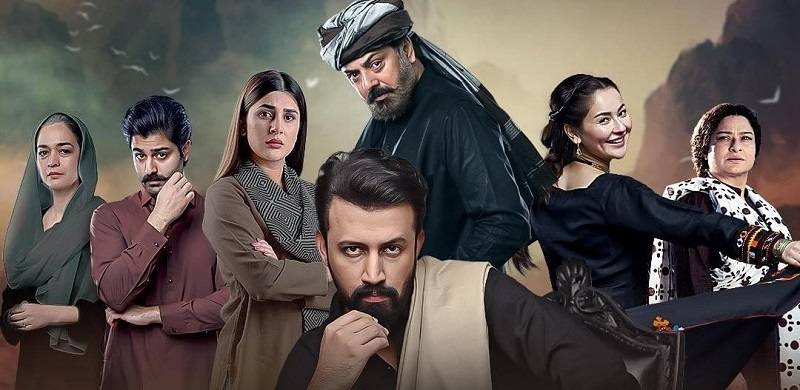
Sang-e-Mah translates to “merciless.” It is a saga of ancient customs being practiced today in a tribal village of Pakistan. Despite being about innately patriarchal and regressive practice of Ghag, the drama is refreshingly progressive. Ghag treats women as objects subjected to the whims of the men around them, but this drama doesn’t. They have a voice.
Sania Saeed is in a truly remarkable avatar. She loses her husband to murder and demands justice with undeterred conviction. Hania Amir is doing a job par excellence in this play, but if you compare it to her other play running simultaneously on another channel, the latter is mind-numbingly plain without any charm. What this indicates is that the fault is not in our stars, but it lies in our production houses and their TRP-driven approach when deciding on drama scripts. You feed the audiences dumb fodder to gain their relatability and attention instead of giving them new, refreshing ideas that challenge their existing mindsets.
The grit and substance shown by Kubra Khan as Sherezaad is exemplary. This is how one should depict abuse survivors. The trauma becomes an inherent part of her personality, yet it doesn’t overpower her entire existence. The haunting memories do resurface from time to time, but she is not defined solely by them. She is a journalist who is lost, uprooted yet kind and empathetic. This is what you call layered aka real character sketching.
The real charmer of the show, Hilmand, is a poetic Shakespearean character. He has gone rogue with the mission to avenge his deceased father. Is he a Hamlet or an Othello? The plot has yet to reveal itself. A marginalised character that exists on the literal outskirts of the city, he talks to his father’s grave, resides with other lunatics of the town, indulges in intoxicants, lives in a bubble of his own in the estranged world of Las Peeran. Lo and behold viewers, Atif Aslam has bagged himself a TV debut for the books.
Moving on to the institution himself, Nouman Ejaz, as always, has done outstanding justice to his character. There is perhaps no one as cinematically intelligent and nuanced as the man himself. The solemn glare in his eyes, the raging depth in his voice and the structure in his approach towards Haaji Marjaan are all marks of brilliant craftmanship.
Sang-e-Mah caters to the masses without consciously trying to. It is not built to gain their traction. But with a culturally relevant, sharp and tight-knit story-line, the audience is drawn automatically. The show promises unresolved conflict and unexplored love angles in the coming episodes.
Here’s to hoping the second half of the drama doesn’t derail and keeps us as entertained as the first half did.
Sania Saeed is in a truly remarkable avatar. She loses her husband to murder and demands justice with undeterred conviction. Hania Amir is doing a job par excellence in this play, but if you compare it to her other play running simultaneously on another channel, the latter is mind-numbingly plain without any charm. What this indicates is that the fault is not in our stars, but it lies in our production houses and their TRP-driven approach when deciding on drama scripts. You feed the audiences dumb fodder to gain their relatability and attention instead of giving them new, refreshing ideas that challenge their existing mindsets.
The grit and substance shown by Kubra Khan as Sherezaad is exemplary. This is how one should depict abuse survivors. The trauma becomes an inherent part of her personality, yet it doesn’t overpower her entire existence. The haunting memories do resurface from time to time, but she is not defined solely by them. She is a journalist who is lost, uprooted yet kind and empathetic. This is what you call layered aka real character sketching.
The real charmer of the show, Hilmand, is a poetic Shakespearean character. He has gone rogue with the mission to avenge his deceased father. Is he a Hamlet or an Othello? The plot has yet to reveal itself. A marginalised character that exists on the literal outskirts of the city, he talks to his father’s grave, resides with other lunatics of the town, indulges in intoxicants, lives in a bubble of his own in the estranged world of Las Peeran. Lo and behold viewers, Atif Aslam has bagged himself a TV debut for the books.
Moving on to the institution himself, Nouman Ejaz, as always, has done outstanding justice to his character. There is perhaps no one as cinematically intelligent and nuanced as the man himself. The solemn glare in his eyes, the raging depth in his voice and the structure in his approach towards Haaji Marjaan are all marks of brilliant craftmanship.
Sang-e-Mah caters to the masses without consciously trying to. It is not built to gain their traction. But with a culturally relevant, sharp and tight-knit story-line, the audience is drawn automatically. The show promises unresolved conflict and unexplored love angles in the coming episodes.
Here’s to hoping the second half of the drama doesn’t derail and keeps us as entertained as the first half did.

